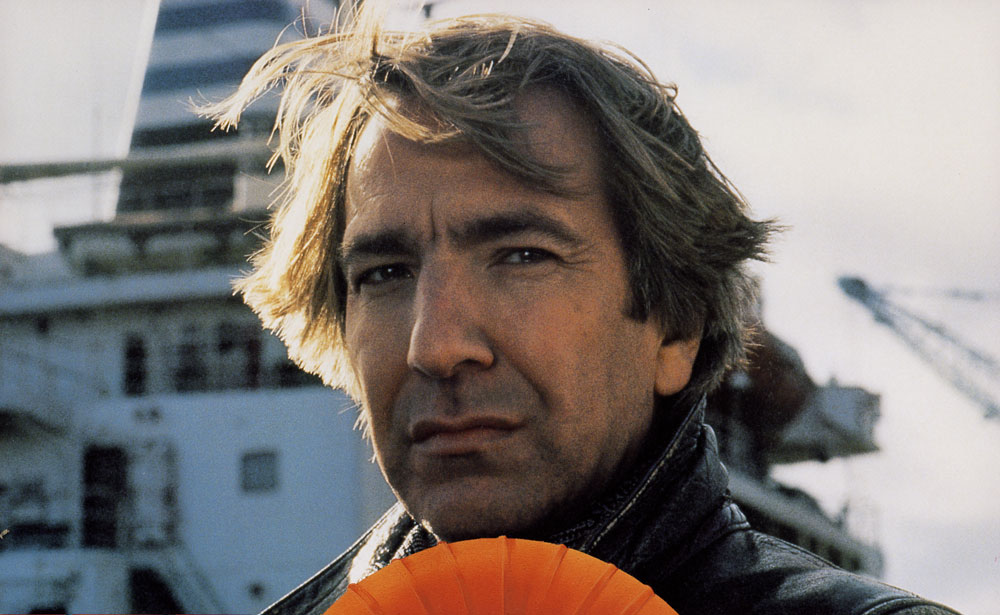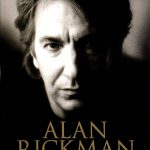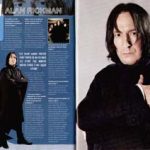Difficult, What Me?
By Dennis Fallowell* – The Observer Review
Alan Rickman has become famous for being insufficiently famous. The man who stole Die Hard from Bruce Willis, who stole Robin Hood from Kevin Costner, who will probably steal the forthcoming An Awfully Big Adventure from Hugh Grant, who dominated the ensemble casts of Anthony Minghella’s Truly, Madly, Deeply and Stephen Poliakoff’s Close My Eyes with a fascinating, slightly reptilian authority, should be a world star by now. Why, in his late forties, he isn’t quite, is only one of several puzzles about him.
Maybe it is because he’s always doing different things – the media lovea man to be one thing in one place. Maybe it is because he’s intensely private. ‘Journalism’ is almost thedirtiest word in his vocabulary and he is giving this interview less because he has two new films about to appear and more because he is trying something different again, as the director of a play which he was partially responsible from commissioning. It is The Winter Guest by Sharman MacDonald and has its world premiere at the West Yorkshire Playhouse before coming down to the Almeida in London.
Mr Rickman is standing in the Almeida wine bar after rehearsals dressed in a navy blue donkey jacket, red tartan trousers, and black boots which are simultaneously lace-up and elastic-sided. He is going through a few script points with a couple of incredibly young actors while ‘high life’ music skips in the background. Too noisy. We transfer to the profound quiet of the empty Almeida Theatre.
First, some background to place him in contest. What sort of family does he come from? Long silence. Very long. Then utterance. ‘I never talk about my home life.’
I don’t mean his life now (he lives in Notting Hill with Rima Horton, an economics lecturer; they have no children). Just his origins. Because I’m trying to place the voice, a rather sloppy sleepy chewing-gum voice off-stage, off-set, but it does have the actor’s resonance.
‘I think it’s unfair on one’s family to see themselves written about in newspapers. They have their lives to live and why should they be dragged into this?’
‘I don’t want to drag anybody anywhere. But where were you born?’
He eases a little. ‘My whole life’s been lived in west London – born, schooled, art-schooled, drama-schooled.’
After the Chelsea School of Art, he worked as a graphic artist for three years, then went to the Royal Academy of Dramatic Art at the age of 27. Why the sudden switch to drama?
‘It never felt like a sudden switch to me. The curse of our times is that you are supposed to decide your life at 16 and stick to that.’
‘Do you have a theory of acting?’
‘I do – but I wouldn’t ever talk about it because it looks stupid in print…’ I wait. ‘…It’s not that I’m being closed. But you interrupt your instincts by explaining. I took one look at Stanislavsky and closed the book very quickly.’
He has generally worked in the serious rather than the commercial theatre and his big break came playing Valmont in the Royal Shakespeare Company’s production of Les Liaisons Dangereuses in 1986 in London and New York.
‘Your most recent stage part was Hamlet. How do you renew Hamlet?’
His jaw drops slowly, hangs there for a while, then slowly lifts: ‘Well…when did it get old?’
‘I see. Yes. A great play is always new. Um…what qualities do you admire in an actor?’
‘It’s unnamable…but one thing an actor has to be is a fit instrument. The thing that wanders out of a Tube station and onto the stage, I mean, it’s not in the case like a violin. An actor has to protect himself a bit. And yet be very open. To be both fit and open is a hard balance to achieve – in fact it’s impossible. I hate putting this into words because it sounds so…wanky.’
‘Aren’t you a member of health club? Are you a fit instrument?’
‘Less fit than I was. Yeah, I’m a member…Actually I go in secret and dutifully bore myself rigid on the machines. My problem with Hamlet was how the hell do you do this thing physically, how do you breathe it? Not only is the play very long but you discover that this bastard Shakespeare has put three huge soliloquies one almost directly after another.’
He has never directed a play before but presumably the transition from acting is as smooth as was that to acting from art.
‘No!’ he exclaims out of his lugubriousness. I think he’s thawing. ‘It was troubled from the very first day! And the main trouble is that as an actor you’ve got too many memories of horrible rehearsals.’
‘How do you direct? Layman’s guide. How to direct a play.’
‘The play makes the rules. This play is about couples who swim in and out of focus so…’
“Do you hope to direct more? Or are you at heart an actor?’
‘I think it’s unnecessary to make a decision like that. This is to do with [the lip curls] journalism, not with me.’
But I defend my question: ‘No. It’s to do with the idea that in order to be really good at something you have to be wholly absorbed by it. Life is short, there’s not time to do everything, one must focus. I’m a writer. There’s no time for me to be, for example, a symphonist as well.’
‘That’s very different,’ he replies. ‘That’s creative. As a writer you are involved in a much more mysterious process. An actor or director is an interpreter. One thing I will say – my job gets harder and harder. The more you understand about what you are capable of, the less the instrument can do it physically. It’s an inverse equation, if that’s the right phrase. I just slammed those two words together. It sounded right.’
Meanwhile, his film career continues to leapfrog in its eccentric fashion.
Mesmer (about the 18th-century precursor of hypnotism, filmed largely in Hungary, with a script by Dennis Potter) is Rickman’s first official film lead – but its release has been arrested by a row. The distributors, Mayfair, dislike it and are refusing to accept delivery on the grounds that it is not the film they paid for. This is unprecedented and the film-makers are appealing against the decision.
It must be painful for Rickman, but he responds in a typically elliptical manner:’…I had a letter today from a German director whom I was supposed to be working with on another brave, independent movie which in the end they couldn’t get together. He finished his letter with, “If only life could be a little more tender and art a little more robust”. That seems to be relevant.
And it was ironical to be at Dennis Potter’s memorial service one day and in a courtroom the next, on both occasions saying the same lines in support of his work.’
‘I want to discuss your appeal. One of things which is appealing about you – forgive the flattery – is your misfit, maverick quality.’
‘Maverick,’ he replies, ‘is a word which appeals to me more than misfit. Maverick is active, misfit is passive.’
‘Let me approach it differently – you could be a huge star, you have that knack, the camera likes you, whatever it is.’
Rickman is an extremely committed actor – yet brings to this intensity a self-mockery and sense of incipient disillusionment which is very modern: the streak of nastiness is crucial to his appeal – men admire the sardonic power-in-reserve and women respond to its sexual implications. I asked one of his female admirers what attracted her and she said this: ‘He has an incredibly sexy voice – it says been there, done that. A lived-in face, but it lights up in unusual ways. He feels so much of our time – people who grew up in the Sixties and Seventies – but the sexiest thing is he can send himself up, often when you’re least expecting it.’
‘And so,’ I say, ‘it’s interesting why, with all these plusses, something is not quite in gear. Is part of you resisting this elevation to iconic status?’ He stares around in funereal bewilderment and I nudge. ‘Maybe this friction with the system is crucial to your appeal. Maybe you’ll become iconic soon…’
‘There’s no master plan,’ he finally divulges. ‘It’s not calculated. Every choice is taken on its own terms. For example, I went straight from filming Mesmer, which was difficult, to doing Mike Newell’s An Awfully Big Adventurewhich was a breeze.’
‘And which, unlike Mesmer, will be released without problems.’
‘I hope so. But, oh, they were two different experiences. If you are dealing with a subject like Mesmer and a writer like Potter, you know it’s going to be a tussle every day to find out whether you can go as far on the screen as is on the page. Whereas I read the part in Adventure and knew immediately how to play it. Also Mike Newell is so efficient at shooting and we were all in Dublin and just wrapped it up. But in Mesmer we were shooting in several countries on a tight budget so…But Mesmer has been seen at the Montreal and Vienna Film Festivals and was invited to the New York Film Festival, but wasn’t allowed to go. Unfortunately a lot of this film industry arguing is not about films but about the size of people’s willies.’
‘But you also have – forgive me for saying so – a reputation for being difficult. Is that fair?’
‘Depends on who’s saying it,’ he replies.
‘Or for being intimidating. When I spoke to Mike Newell, he said that before he started shooting Adventure he’d been thinking, oh God, I’m going to work with Alan Rickman, I must be on my best behaviour. He’s so choosy, how can I ever live up to the fact that he’s chosen me?’
‘Like he doesn’t choose what he’s gonna do?’ retaliates Rickman, opening his eyes wide – they are the colour of pale tea without milk. ‘Like, I didn’t go on to the set thinking, “Oh, God, I must do my best because this is Mike Newell who’s had this world hit with Four Weddings and a Funeral?’ Apart from the film business being all about the size of people’s willies, we also swim in bucketloads of bullshit. There are plenty of people more difficult than me.’
‘Who?’
‘Juliet Stevenson, for example. I would say that “difficult” means a highly intelligent human being who asks pertinent questions and tries to use her or himself to the fullest extent. Who says I’m difficult? Since I know I don’t shout and scream about the size of my …’
‘Willy?’
‘I was going to say dressing-room, then I can only assume it’s about my approach to the work – in which case I don’t mind being called difficult.’
‘Does Hollywood interest you?’
‘Yes. I’m not stupid. I know that we would not be sitting here doing this without Hollywood.’
‘Oh, we might be.’
‘No, we wouldn’t It’s Hollywood which puts you on the bigger map.’
‘Isn’t that a slightly melancholy fact?’
‘It’s not melancholy. It’s tragic, appalling. How much longer do people have to bleat on about throwing away a British and European film industry before it’s properly organised? It’s awful that we all have to toddle off to Hollywood.’
‘You’ve acted in Jarry, Brecht, Ibsen, Chekhov, Wedekind, and so on, but have you acted in Europe?’
‘In Germany, Holland, Switzerland. We took The Brothers Karamozov from the Edinburgh Festival to Russia, in English, with four actors, and a fur coat being swapped around. In one place we performed it in a 7th-century church on a hill and finished with the four of us singing The Ode to Joy climbing up a belltower – I don’t think the Russians understood a word.’
He laughs, but just before he laughs, he looks as though he’s about to burst into tears; a curious, characteristic expression of his. Generally his manner is a tranquilised exasperation, but it constantly bubbles into drollery and laughter.
‘What’s the buzz in being an actor?’
‘…Something to do with a collective experience combined with a sense of one’s own power? There can be a huge buzz in acting but the thing is…the moments are frequently followed by a very swift kick in the guts or smack to the head.’
‘No more questions.’
‘Torture over, thank God.’



